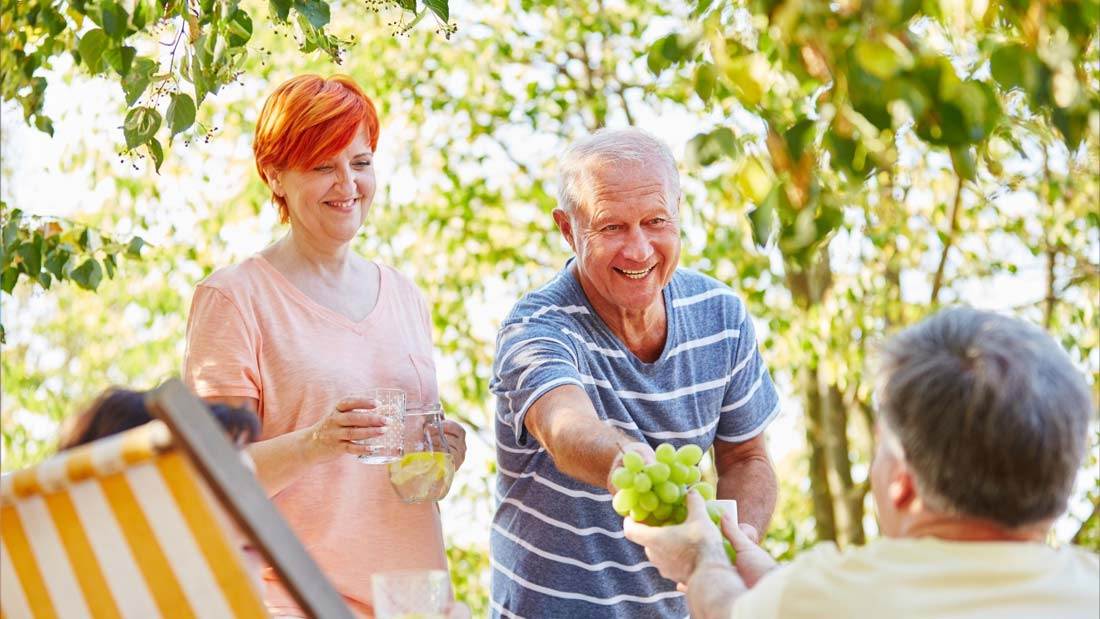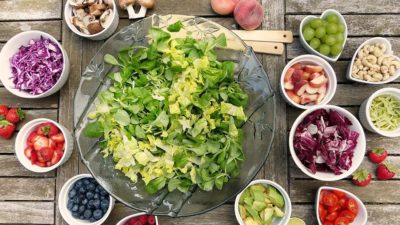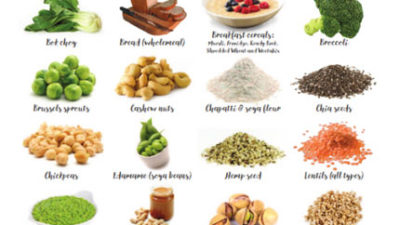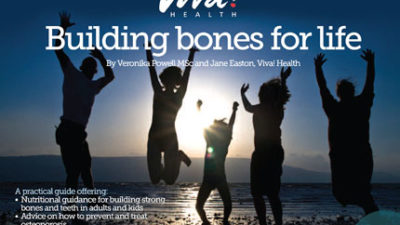Nutrition for the more mature

As we age so do our bodies and it means we may need to tweak our diet a little to stay fit and sprightly.
Why age matters
The way our body and mind works changes as we get older, which means that in order to be at our best, we should adapt our diet to our new needs.
An important part of aging are physical changes – we don’t absorb some nutrients as well so we need more of them, our hormone levels decline, the immune system gets weaker and we may have some common ailments, such as joint or back pain.
Alongside the physical are changes in attitude – many of us like to indulge a little too much or start craving childhood treats because we want to enjoy our golden years. There may be nothing wrong with this but it can get in the way of us taking in all the essential nutrients we should have. Sometimes there are too many ‘empty’ calories and not enough of what our bodies truly need. That can have a knock on effect and contribute to both mental and physical decline – some old age health issues are partly caused by poor nutrition.
Healthy bones
One of the big physical changes is a decreasing level of sex hormones, which stimulate bone maintenance amongst other functions. When they reduce, we need to make sure our diet is the best it can be to protect our bones.
Eat plenty of foods rich in calcium, magnesium, vitamin K and other nutrients essential to healthy bones. The best sources are:
- Nuts and seeds and butters or pastes made from them – in particular almonds, tahini (from sesame seeds), chia and poppy seeds
- Green leafy vegetables – kale, broccoli, rocket, spring greens, Brussels sprouts and watercress
- Figs (dried or fresh), oranges, tangerines
- Tofu and edamame
- Fortified plant milks and cereals
Vitamin D is just as important for healthy bones. Its main source is sunshine on bare skin which triggers vitamin D production in the body. However, in autumn and winter there isn’t sufficient sunshine and it’s not strong enough, while in spring and summer we often cover up or use sunscreen so we still don’t get enough. The UK government recommends that we take a vitamin D supplement – a dose of 10 micrograms (400IU) is all we need.
Vitamin B12
You’ve probably heard all about vitamin B12 by now but there’s one crucial thing to remember – as we age, we are less efficient at absorbing it. Everyone over the age of 50 is recommended to take a daily supplement regardless of their diet. Choose a supplement with a dose of 50 micrograms but don’t go above 2,000 micrograms.
Vitamin B12 deficiency may look a little like mental decline that some expect in old age – memory problems, brain fog, low energy or various pains and tingling throughout the body. It’s more common in older adults than you may think so don’t underestimate it.
Protein
There is plenty of protein in a vegan diet but an unbalanced diet may be lacking it. Many older people fail to eat enough protein, favouring carbohydrates a bit too much. Foods such as bread, rice, potatoes, cake and pies may take centre stage, along with some fruit and veggies, while protein-rich foods lag behind.
Include a good protein source at every meal – lentils, beans, chickpeas, tofu, tempeh, edamame, mock meats, nuts or seeds.
Wholegrains and heart health
Eating wholegrains and avoiding white flour products can have a bigger health effect than you may think. Wholegrains keep you regular thanks to all the fibre they contain, they’re a good source of B vitamins, some minerals and protein, but there’s another reason why you should eat them – wholegrains protect your heart health, lowering your cholesterol and blood pressure, while white flour products can make matters worse.
Wholegrains are foods such as wholemeal bread, brown rice, oats, whole wheat pasta, quinoa or buckwheat – eat plenty of them! On the other hand, avoid white bread, pastries, pies, white flour biscuits or crackers.
Appetite and digestion
Loss of appetite is common in older age and again raises the issue of poor nutrition. If low appetite isn’t caused by an illness or medication, it’s possible it’s down to a lack of exercise. You don’t need to take up running, a simple walk can nicely boost your appetite! In other cases, appetite loss may be linked to dehydration so make sure to drink enough water or tea. Both hydration and exercise are great for the digestive system because they, quite literally, keep things moving.
Appetite loss may also be the result of difficulty chewing or other dental problems. Sometimes, when the only foods you can eat are mushy or liquid, you are likely to reach a point where you just lose interest. To remedy this, experiment with different flavours, textures and food combinations – there are bound to be some winners there!
More serious issues that may underlie loss of appetite are depression, loneliness or cognitive decline. These obviously require attention and long-term lifestyle changes.
Respiratory and joint health
These issues may seem unrelated but breathing problems and joint pain can both have the same thing in common – inflammation of the tissues. It may be necessary to take medications but food can also help.
An antioxidant-rich diet is known to reduce inflammation in the airways and joints, reducing the bothersome symptoms. Eat at least five portions of fruit and vegetables daily and bear in mind that those with the richest colours – dark green, red or orange – contain the most antioxidants. The huge plus is that they are also excellent for your immune system!
Anything else?
Well, yes. Many of the foods I’ve mentioned are also good sources of vitamin E, important for the functioning of all organs, healthy vision and the immune system. It’s much better to get it from foods – nuts, seeds, vegetable oils, soya or avocado – than from supplements.
Last but not least, choose your fats carefully – avoid hydrogenated fats or shortening and use rapeseed or olive oil instead, small amounts of margarine and take a spoonful of flaxseed oil daily to top up your omega-3 fat intake.
A well-balanced vegan diet can make you feel so good you’ll forget your age!







